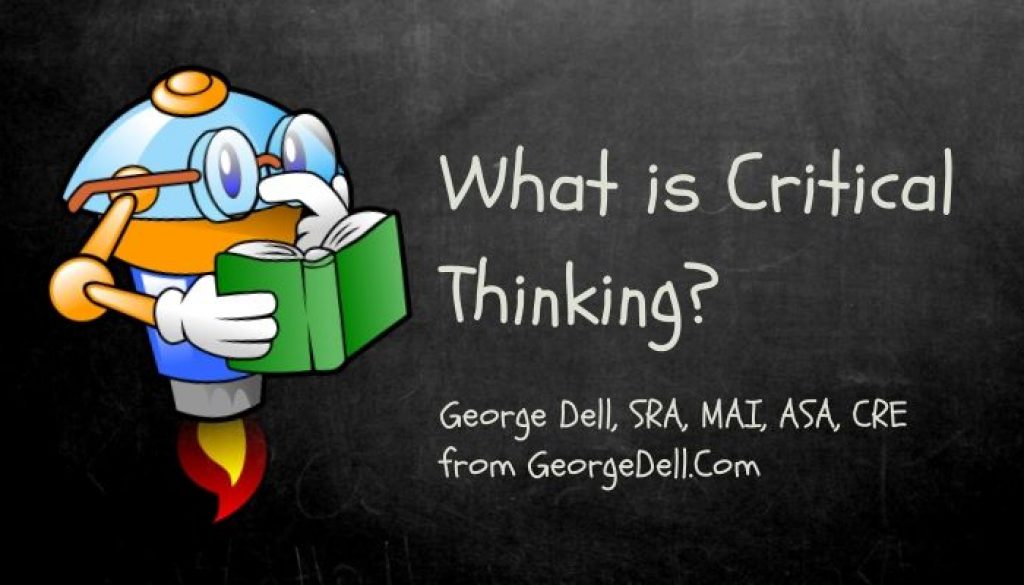Can we think about critical thinking? What does it have to do with appraisal?
The word is used many times in USPAP (Uniform Standards of Professional Appraisal Practice) and The Appraisal of Real Estate. However, it’s only used once each in the context of thinking. In USPAP, it’s in Advisory Opinion on Scope of work, where it mentions “critical judgments in determining the appropriate scope of work.” In TARE, it states “critically review available data as necessary.” Other uses are in the context of “it’s important,” not in the context of what an appraiser does.
In my brief career as a university instructor, I was privileged to teach at the San Diego State University’s ‘Freshman Success Program’. One topic was critical thinking. I learned a lot. I was already an appraiser. What I learned seemed to apply directly to what we did for a living.
Simply put, “judgment is important.”
The issue is – how do you separate good judgment from bad judgment? The answers are in critical thinking, and even the way of the ‘affective spirit’. Good judgment is an essential part of the data science approach to analysis and decisioning. Evidence Based Valuation© is a subset of data science. What is different between the data science approach and legacy appraisal practices is that critical thinking and field-related expertise are explicitly expected. So, what is critical thinking, and how does it make for a better professional career in valuation?
The Foundation for Critical Thinking says:
“Critical thinking is self-guided, self-disciplined thinking which attempts to reason at the highest level of quality in a fair-minded way. People who think critically attempt, with consistent and conscious effort, to live rationally, reasonably, and empathically. They are keenly aware of the inherently flawed nature of human thinking when left unchecked. They strive to diminish the power of their egocentric and sociocentric tendencies. They use the intellectual tools that critical thinking offers – concepts and principles that enable them to analyze, assess, and improve thinking.”
In short, critical thinking comprises informal logic, as well as cognitive skills, such as interpretation, analysis, evaluation, inference, explanation and self-regulation.
Self-regulation, in turn, depends on a believed and internalized system of desire for ethical behavior, and steadfast motive to improve in judgment and competency and service. It’s the belief that happiness comes through a real attitude of service. And the knowledge that financial rewards follow service. Self-regulation is the path to receive what we all seek: to belong, to be respected and accepted. And self-regulation follows an internal spirit. It is the spirit of an affective disposition.
Author Peter Facione, in his Critical Thinking: What It Is and Why it Counts* speaks of having an affective disposition. An affective disposition meshes the emotional and primal drives to mental decision. The decision is “about attitudes about life – living with the critical spirit – a probing inquisitiveness, a keenness of mind, a zealous dedication to reason, and a hunger or eagerness for reliable information.”
I believe, to be a good appraiser, one must develop and grow a disposition of the critical thinking spirit. We suggest this as a core principle of the Community of Asset Analysts.
*GeorgeDell.Com, Valuemetrics.Info or any of our staff are not related to or receive any reimbursement from Peter Facione or Insightassessment.com for this reference.

December 11, 2019 @ 8:17 am
Good article. Thanks for the book reference. I’m always looking for ways to improve how I explain why i think what I think about real estate – and life in general.
December 11, 2019 @ 9:55 am
Thank you Mike!
Responses and input is always appreciated.
In the SGDS workshop, we hear about the three types of reasoning in science. Judgment and domain knowledge are critical parts of Evidence Based Valuation(c). Each reasoning type (abductive, inductive, and deductive) has a specific use in valuation and risk assessment delivery.
George
December 11, 2019 @ 8:27 pm
Critical thinking is a continual process and is necessarily dependent upon cognitive ability, experience and, most importantly, empathetic and unbiased character.
September 7, 2022 @ 6:25 am
This (critical thinking) is a skill that must be constantly practiced. You can not become a critical thinker overnight. Real estate valuation requires this type of disciplined and long term approach. Real estate valuation is not just a plug in the numbers/data type of task. Unfortunately many of the companies/people that we as real estate analyst do work for, do not see the profession beyond a plug and play role. As a result, cultivating these types of critical thinking skills is a must and should be woven throughout our narratives A good place to start: https://www.criticalthinking.org/